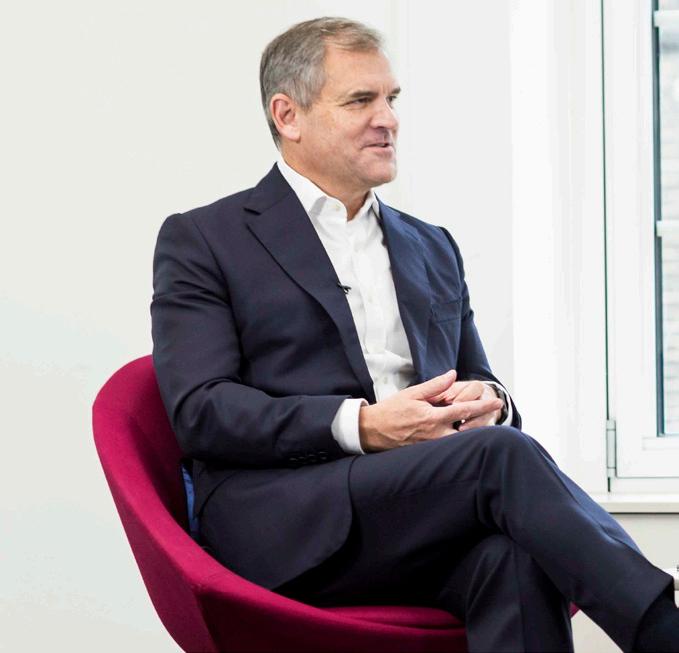
6 minute read
Conversations: Lockdown learnings from some of Britain’s best managers
by CMI_
To support members through the COVID-19 crisis, CMI’s chief executive Ann Francke has hosted live conversations every Friday lunchtime during lockdown. We look back at some of the highlights and enduring lessons…
On 21 March, as CMI switched to working from home, Ann shared her advice for remote management: be virtually visible, manage your team’s mental health, be agile when it comes to your priorities, and manage with a human face. Several months later, these lessons still stand.
On 28 March, as Britain entered full lockdown, Ann’s guest was Simon Blake CMgr CCMI, chief executive of Mental Health First Aid England. Simon advised acknowledging that this is not business as usual. “Eat well, don’t drink too much, sleep well and exercise,” he said. And we loved his way of checking in with the team: “How are you and what are you doing to look after yourself?”
In their 3 April webinar, Air Vice-Marshal Warren “Bunny” James CMgr CCMI and Angela Owen CMgr CCMI, founder of Women in Defence UK, said that it helps to acknowledge that this really is a crisis. They coined a crisis-management model that we’ve drawn on a lot ever since: Learn – understand what’s changing. Earn – earn the respect of teams in the way we do things. Return – know what you can give back (both in the way you coach and mentor and in how you’ll be better when this is all over.
CMI president Bruce Carnegie-Brown CMgr CCMI joined governance expert Patrick Dunne CMgr CCMI for the 10 April webinar. They noted that employee safety and wellbeing are now top of the list of priorities for all organisations – even if that has a detrimental effect on customer service. Patrick added that the crisis was changing the way boards approach risk and risk management. “We’ll think more about planning for consequences than planning for causes,” he said.

CMI president Bruce Carnegie-Brown
As the crisis has deepened, so has its impact on jobs, with an estimated 650,000 lost so far. Kate Grussing, founder of Sapphire Partners Executive Search, and Susanne Thorning-Lund CMgr CCMI, a partner at Odgers Berndtson, offered these tips for job-hunting in these extraordinary times: don’t be defeatist; stay up to date by finding the sectors that are hiring; network respectfully and update your references; get comfortable with using technology in the interview process; aim to be someone who works well in a crisis; emphasise that you’re flexible, committed and patient; and own your career development.
Sir Charlie Mayfield CMgr CCMI, chair of Be the Business and QA Training, has educated himself about cloud computing during the crisis. “This is a great time to get that training done and complete it,” he said in our webinar on 24 April.
University finances have been under pressure for some time, said Professor Bob Cryan CMgr CCMI, vice-chancellor of the University of Huddersfield. COVID-19 is exacerbating that. On 1 May, he advised students to continue with university courses “because those degrees will impact you for the rest of your life and transform your life”. His advice came in the form of the acronym GROW: Generous – be generous with others and yourself; Resilience – these are difficult times so use them to build your resilience; Opportunities – keep seeking chances for development; Wins – work on and seek those small, important wins.
The best managers have shown great empathy during the COVID-19 crisis, reaching out to anxious team members, even over video-conferencing platforms. On 8 May, Rebecca Robins CMgr CCMI from brand consultancy Interbrand introduced members to the phrase “lead with love”. Tamara Box of the law firm Reed Smith observed: “Don’t underestimate what a difference it has made to see your colleagues and clients in their pyjamas, to meet their pets, to meet their children. It creates a closeness that’s totally different to what you get in an office.”

CMI research with Engaging Works (EW) discovered that the majority of managers are happier working from home. “They’re not spending money on commuting… They feel better off. They feel more informed, and they feel more empowered,” said Mark, Lord Price CMgr CCMI, EW’s founder and the incoming CMI president, in our webinar on 15 May.
At the beginning of the crisis, people were worried about food shortages, but the industry has shown incredible resilience. On 22 May, we heard from Fiona Dawson CMgr CCMI, global president of Mars Food, and Steve Axe CMgr CCMI, group chief marketing officer of Nomad Foods, about how it has managed this. Both said it had been important to instil pride in employees’ keyworker status. And Steve said the crisis has shown how quickly things can get done: “Advertising campaigns used to take nine months. Now they can take 14 days.”
Lockdown put tremendous strain on individuals, families and organisations, but it also opened our eyes to the power of technology. Two of Britain’s most effective networkers – Vanessa Vallely CMgr CCMI, CEO and founder of WeAreTheCity, and John Jeffcock CMgr CCMI, CEO and founder of Winmark – argued that Zoom, Microsoft Teams and the like have allowed leaders to hear new voices within their organisations. “Everyone’s become quite informal, [events] are quite intimate… the suits are gone and the informality has broken down barriers,” said John on 5 June.

Elysia McCaffrey
The Black Lives Matter protests across the world are a “watershed moment” for change, said Elysia McCaffrey, interim director of the Government Equalities Office in our 12 June webinar. “Not being racist isn’t enough. You have to be anti-racist. You have to take really practical steps.”
“Leadership has become more human,” said Stuart Brocklehurst CMgr CCMI, founder and CEO of procurement platform Applegate, on 19 June. Stuart has spoken honestly with colleagues about the isolation he has sometimes felt living alone during lockdown. “It’s OK not to be OK,” he says. Maggie Buggie CMgr CCMI, global head of innovation services and solutions at SAP, said that in her weekly team sessions, “we go around and say to each other, ‘What am I sad about? What am I glad about? What am I mad about?’” Emotional honesty is at the heart of great management.
Coming out of the crisis, skills will rise to the top of the national agenda. How do we give young people the skills they need in a tight labour market? How do we upskill those who have been made redundant? The government needs to provide a north star in terms of guiding the direction, said Rachel Sandby-Thomas CMgr CCMI, registrar at the University of Warwick, and Euan Blair, founder and CEO of Whitehat, an apprenticeship education provider, in Ann’s 26 June webinar. This needs to be backed up by tax incentives and wage subsidies for employers.
Whatever we do, let’s not “restore factory settings”, said Rosalind Penny CMgr CCMI, deputy director of organisational development for the Royal Berkshire Trust, on 7 July. All organisations need to try to retain “a sense of boldness that the crisis has enabled.” Her fellow guest was Sam Allen CMgr CCMI, CEO of Sussex Partnership NHS Foundation Trust, who is profiled on page 18.
And while this crisis has been profound, the climate change emergency may be greater still – the ultimate test of leadership. “The only effective and meaningful economic recovery is a green recovery,” said Dr Hayaatun Sillem CMgr CCMI, chief executive of the Royal Academy of Engineering, on 14 July. “We can innovate our way out of this [in a way] that will give us a better economy, a greener economy, and a bigger economy,” said Lt General Richard Nugee CMgr CCMI, climate change and sustainability lead at the MoD.
To watch back any of Ann’s webinar conversations, visit CMI’s YouTube channel or head to our COVID-19 hub at manager.org.uk










